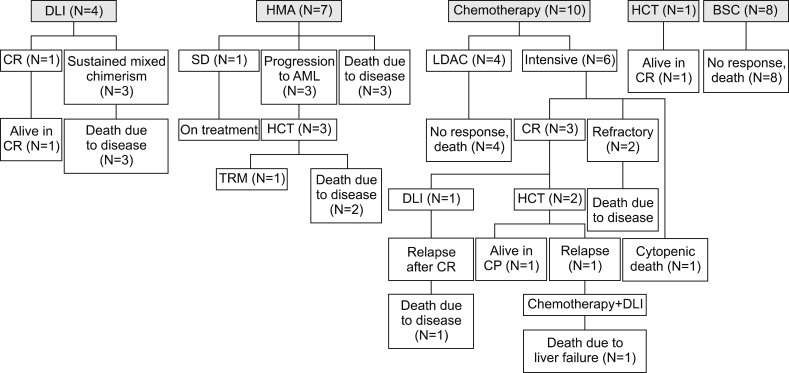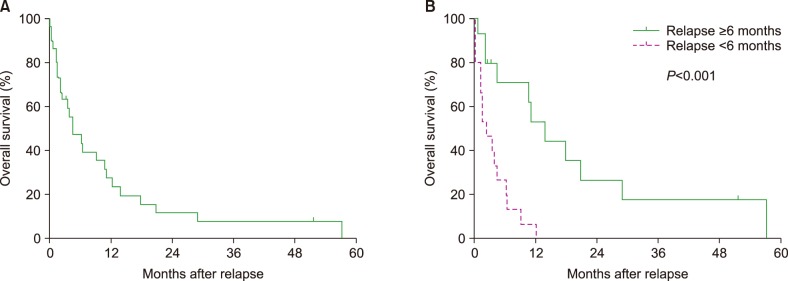Blood Res.
2018 Dec;53(4):288-293. 10.5045/br.2018.53.4.288.
Treatment and clinical outcomes of patients relapsing after allogeneic hematopoietic cell transplantation for myelodysplastic syndrome
- Affiliations
-
- 1Department of Hematology, Asan Medical Center, University of Ulsan College of Medicine, Seoul, Korea. jhlee3@amc.seoul.kr
- KMID: 2429302
- DOI: http://doi.org/10.5045/br.2018.53.4.288
Abstract
- BACKGROUND
Although allogeneic hematopoietic cell transplantation (HCT) is the only curative treatment option for myelodysplastic syndrome (MDS), a substantial number of patients experience relapse. We reviewed the clinical outcomes of patients with MDS who relapsed after allogeneic HCT.
METHODS
Thirty patients who experienced relapse or progression after allogeneic HCT for MDS between July 2000 and May 2016 were included in this retrospective analysis.
RESULTS
The median time from HCT to relapse was 6.6 (range, 0.9-136.3) months. Donor lymphocyte infusions (DLIs) were administered to four patients: one achieved complete remission (CR) and survived disease free, while three did not respond to DLI and died. Hypomethylating agents were administered to seven patients: one who had stable disease continuously received decitabine, while six died without response to treatment. Six patients received AML-like intensive chemotherapy, and three achieved CR: two underwent second HCT and one DLI. One patient receiving second HCT survived without disease, but the other two relapsed and died. Three, four, and eight patients who did not respond to intensive chemotherapy, low-dose cytarabine, and best supportive care, respectively, died. One patient who underwent second HCT following cytogenetic relapse survived disease free. Median overall survival after relapse was 4.4 months, and relapse within 6 months after HCT was associated with shorter survival.
CONCLUSION
Outcomes of MDS patients relapsing after allogeneic HCT were disappointing. Some patients could be saved using DLI or second HCT.
Keyword
MeSH Terms
Figure
Cited by 1 articles
-
Lenalidomide for anemia correction in lower-risk del(5q) myelodysplastic syndrome patients of Asian ethnicity
Junshik Hong, Yoo Jin Lee, Sung Hwa Bae, Jun Ho Yi, Sungwoo Park, Myung Hee Chang, Young Hoon Park, Shin Young Hyun, Joo-Seop Chung, Ji Eun Jang, Joo Young Jung, So-Yeon Jeon, Seo-Young Song, Hawk Kim, Dae Sik Kim, Sung-Hyun Kim, Min Kyoung Kim, Sang Hoon Han, Seonyang Park, Yoo-Jin Kim, Je-Hwan Lee, on behalf of the AML, MDS Working Party of the Korean Society of Hematology
Blood Res. 2021;56(2):102-108. doi: 10.5045/br.2021.2021086.
Reference
-
1. Thanarajasingam G, Kim HT, Cutler C, et al. Outcome and prognostic factors for patients who relapse after allogeneic hematopoietic stem cell transplantation. Biol Blood Marrow Transplant. 2013; 19:1713–1718. PMID: 24076323.
Article2. Kekre N, Koreth J. Novel strategies to prevent relapse after allogeneic haematopoietic stem cell transplantation for acute myeloid leukaemia and myelodysplastic syndromes. Curr Opin Hematol. 2015; 22:116–122. PMID: 25575033.
Article3. Cheson BD, Greenberg PL, Bennett JM, et al. Clinical application and proposal for modification of the International Working Group (IWG) response criteria in myelodysplasia. Blood. 2006; 108:419–425. PMID: 16609072.
Article4. Guièze R, Damaj G, Pereira B, et al. Management of myelodysplastic syndrome relapsing after allogeneic hematopoietic stem cell transplantation: a study by the French Society of Bone Marrow Transplantation and Cell Therapies. Biol Blood Marrow Transplant. 2016; 22:240–247. PMID: 26256942.5. Sauer T, Silling G, Groth C, et al. Treatment strategies in patients with AML or high-risk myelodysplastic syndrome relapsed after Allo-SCT. Bone Marrow Transplant. 2015; 50:485–492. PMID: 25599163.
Article6. Schroeder T, Czibere A, Platzbecker U, et al. Azacitidine and donor lymphocyte infusions as first salvage therapy for relapse of AML or MDS after allogeneic stem cell transplantation. Leukemia. 2013; 27:1229–1235. PMID: 23314834.
Article7. Orti G, Sanz J, Bermudez A, et al. Outcome of second allogeneic hematopoietic cell transplantation after relapse of myeloid malignancies following allogeneic hematopoietic cell transplantation: A Retrospective Cohort on Behalf of the Grupo Español de Trasplante Hematopoyetico. Biol Blood Marrow Transplant. 2016; 22:584–588. PMID: 26631751.
Article8. Takami A, Yano S, Yokoyama H, et al. Donor lymphocyte infusion for the treatment of relapsed acute myeloid leukemia after allogeneic hematopoietic stem cell transplantation: a retrospective analysis by the Adult Acute Myeloid Leukemia Working Group of the Japan Society for Hematopoietic Cell Transplantation. Biol Blood Marrow Transplant. 2014; 20:1785–1790. PMID: 25034960.
Article9. Krishnamurthy P, Potter VT, Barber LD, et al. Outcome of donor lymphocyte infusion after T cell-depleted allogeneic hematopoietic stem cell transplantation for acute myelogenous leukemia and myelodysplastic syndromes. Biol Blood Marrow Transplant. 2013; 19:562–568. PMID: 23266740.
- Full Text Links
- Actions
-
Cited
- CITED
-
- Close
- Share
- Similar articles
-
- Allogeneic hematopoietic stem cell transplantation for myelodysplastic syndromes
- Successful treatment of myelodysplastic syndrome and Behcet colitis after allogeneic hematopoietic stem cell transplantation
- Successful Hematopoietic Stem Cell Transplantation in Myelodysplastic Syndrome with Invasive Fungal Infection: A Case Report
- Evans Syndrome following T Cell-repleted Unrelated Bone Marrow Transplantation for Myelodysplastic Syndrome: Successful Response to High-dose Corticosteroid
- Pediatric Allogeneic Hematopoietic Stem Cell Transplantation in Korea: April 2000: The Korean Society of Pediatric Hematology-Oncology



